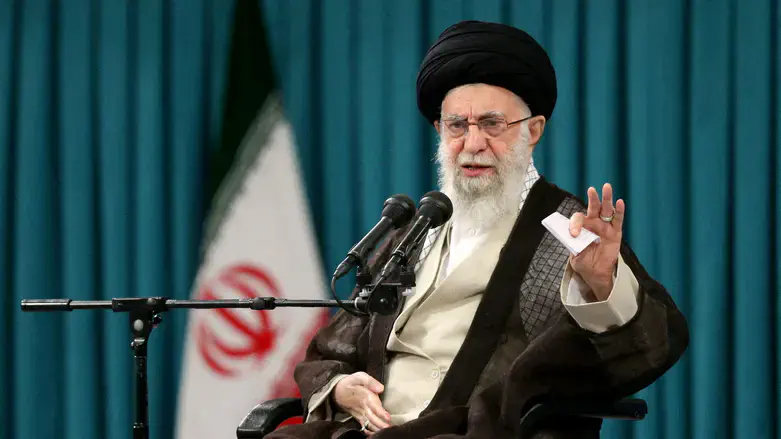
Iran's Supreme Leader, Ayatollah Ali Khamenei, reportedly urged Hezbollah leader Hassan Nasrallah to flee Lebanon just days before he was eliminated in an Israeli air strike in Beirut, three Iranian sources told Reuters on Wednesday.
Now, Khamenei is deeply concerned about Israeli infiltration within Tehran's senior government ranks, the sources said.
After the attack on Hezbollah’s pagers on September 17, Khamenei sent an envoy to Nasrallah, pleading with him to leave for Iran due to intelligence reports that Israel had agents within Hezbollah and was plotting to kill him, one of the sources, a senior Iranian official, told Reuters.
The messenger, Brigadier General Abbas Nilforoushan, a high-ranking commander of the Iranian Revolutionary Guards, was in Nasrallah’s bunker when it was struck by Israeli bombs and was also eliminated.
Since Saturday, Khamenei has been in a secure location inside Iran and personally ordered the firing of around 200 missiles at Israel on Tuesday as retaliation for the deaths of Nasrallah and Nilforoushan, according to another senior Iranian official.
The Revolutionary Guards issued a statement citing these deaths, along with the July killing of Hamas leader Ismail Haniyeh in Tehran and Israeli attacks on Lebanon, for the missile attack. Israel has not claimed responsibility for Haniyeh's death.
Nasrallah’s death has led Iranian authorities to intensify efforts to uncover potential infiltrations within Iran’s ranks, including the Revolutionary Guards and senior security officials, a second Iranian official told Reuters. They are especially scrutinizing those who travel abroad or have family members outside of Iran. Tehran became suspicious of certain members of the Guards who frequently traveled to Lebanon, especially after one individual began inquiring about Nasrallah’s whereabouts and how long he would stay in specific locations.
This individual, along with several others, has been arrested, according to the first official. The suspect’s family had relocated outside of Iran, but the official did not provide further details.
The second official noted that Nasrallah's elimination has caused mistrust to grow between Tehran and Hezbollah, as well as within Hezbollah itself.
Tehran and Hezbollah had already been on high alert over possible Mossad infiltrations after the July elimination of Hezbollah commander Fuad Shukr during an Israeli air strike in Beirut. Shukr was meeting with an IRGC commander at the time, according to two Hezbollah sources and a Lebanese security official. A few hours after this, Haniyeh was killed in Tehran.
Israel publicly took responsibility for Shukr’s assassination but has not commented on Haniyeh’s death.
Khamenei’s call for Nasrallah to relocate to Iran came after thousands of Hezbollah’s pagers and walkie-talkies exploded in attacks on September 17 and 18, the first official said. These attacks have been widely attributed to Israel, although Israel has not officially claimed responsibility. Despite warnings from Tehran, Nasrallah was confident in his security and trusted his inner circle, the official told Reuters.
Khamenei made a second attempt to persuade Nasrallah to leave Lebanon through Nilforoushan, urging him to relocate to Iran for safety. However, Nasrallah remained adamant about staying in Lebanon, according to the report.
Meanwhile, Hezbollah began a large-scale investigation in Lebanon, probing its ranks to root out Israeli spies. Sheikh Nabil Kaouk, a senior Hezbollah figure, was leading the inquiry before he was eliminated in an Israeli raid a day after Nasrallah’s assassination. The raid followed another that targeted senior Hezbollah commanders involved in the investigation. Kaouk had been questioning those involved in logistics and individuals linked to the pagers and walkie-talkies, according to a Hezbollah source.
Hezbollah is grappling with the aftermath of Nasrallah’s elimination, particularly its shock at Israel's successful infiltration, seven sources confirmed to Reuters.
Several commanders who were eliminated last week were discreetly buried, with plans for a religious ceremony once the conflict subsides. Hezbollah is considering a religious decree to bury Nasrallah temporarily, with an official funeral to follow when the situation allows, according to four Lebanese sources.
Hezbollah has not officially appointed a successor to Nasrallah, likely to avoid making the new leader an immediate target for Israeli elimination, they said.
(Israel National News' North American desk is keeping you updated until the start of Rosh Hashanah in New York. The time posted automatically on all Israel National News articles, however, is Israeli time.)
